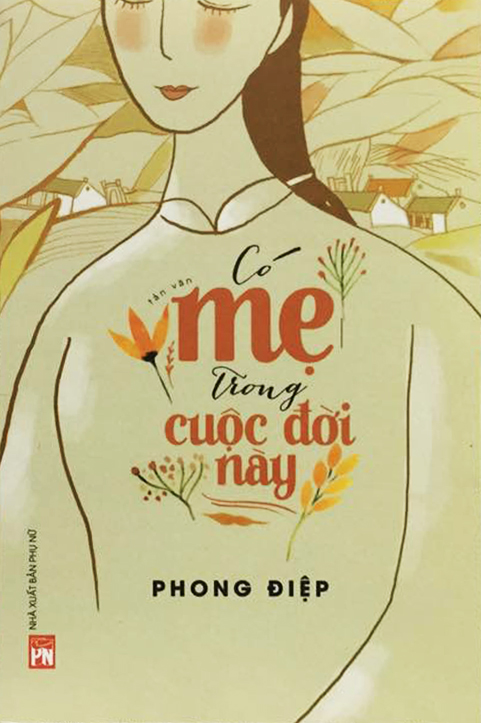 - Writer Phong Diep was born in 1976 in Nam Dinh province and is working at Nhan dan Newspaper. So far she has written 20 books, including short story collections, novels, long stories for children, prose collections, and literary dialogues. On the occasion of the debut of her prose collection titled "Có mẹ trong cuộc đời này" (Mother’s always there in life), the Van nghe Quan doi Magazine had an interview with the collection’s author.
- Writer Phong Diep was born in 1976 in Nam Dinh province and is working at Nhan dan Newspaper. So far she has written 20 books, including short story collections, novels, long stories for children, prose collections, and literary dialogues. On the occasion of the debut of her prose collection titled "Có mẹ trong cuộc đời này" (Mother’s always there in life), the Van nghe Quan doi Magazine had an interview with the collection’s author.
Writer Phong Diep
Reporter: I could still sense the feelings when I read “Mother’s always there in life”. In the prose collection, I can see my childhood and I can also see me at present. It seems that you wrote this book for all those who had their childhood and those who are mothers. But first and foremost I think that you wrote for your mother and your children?
Writer Phong Diep: I would like to thank readers for reading and saving the same feelings for “Mother’s always there in life.” As the name of the book is, I wrote about my mother; my mother in my memories of childhood full of hardships but sweet and warm; my mother in the present time when I have also become a mother with two children, busy all day taking care of them. You know, I thought about my mother all the time when my children were still small and got sick regularly, when I had to take so much care of them that both my children and I turned weak and pale. I thought about how my mother brought me up as I used to be a little girl so sick all the time that sometimes I didn’t think I would be grown up. My mother was then studying, working, and raising us up because my father was serving in a military unit stationed far from home year after year. As it is said, “Only when you become a mother will you really understand the mother’s heart.” And I in turn brought my children up with all my heart and mind and as earnestly as mother did to me only to find out how tormented I feel and miserably I think that I could never be able to repay my mother enough with my filial piety. From those feelings and the emotion, I wrote the prose as if the writing was there for me to open my heart. There were times, when I just finished a piece of writing, I sat still, tears in my eyes, wishing to once again become small in my mother’s hands as before...
Reporter: Most of us, women, go from being children to becoming mothers. Your collection is like an explanation for the feelings that swing women’s hearts sometimes. It made me really touched reading your prose.
Writer Phong Diep: Yes, it is really the ever-flowing source of love that is handed down from generation to generation, from the mother to children. The children then continue to keep that “fire of love” burning. The feeling of being both a child and a mother is strangely marvelous. I am strong in front of my children, but feel small in front of my mother. In fact, every time when I feel so much weary and don’t dare to show that feeling in front of the children, I come to my mother. As I hear my mother encourage me or even gently tell me off..., I am like being reenergized and then I continue making efforts to embark on the long way ahead.
Reporter: In the preface, you say that the genre is what that helped you write this collection. However, deep down inside I think it is the powerful and hidden emotions that helped. Perhaps, do you think readers can get closer to and understand you better with “Mother’s always there in life”?
Writer Phong Diep: As it is a kind of non-fiction, prose helps readers and the writer come closer together. The emotion is also truly of the writer, not that of someone else. Therefore, I like writing prose. As for this genre, I write as a way to talk and open my heart. I write out all the feelings that are from the bottom of my heart. I write to keep to myself the fragile moments of this chaotic and complex life. If I did not write, I would not know where to open my heart to and where to talk out loud my thoughts. There’s this one thing: If I did not write, I feel that, my life would unnoticingly run the risk of becoming a programmed machine.
Reporter: In the urban life, it seems that the relationship in the family is being stretched out in a... reluctant but unavoidable way. Sometimes it becomes so invisible that we do not even realize it. In “Letter to mother,” “City afternoons,” or “Procedures to become a city dweller,” to name a few, are you trying to hold on to that string of family relationship or do you want to find another better way?
Writer Phong Diep: I just want to share the stories in this life that each and every one of us, in one way or another, is part of. And each person has his/her own way to look at them (the stories). The same thing applies to taking care of children or fostering the relationship among family members. A person may see it differently from another. However, the family is always a very important factor. There is a saying that I like very much, “Home is where the storm ceases in front of the door.” Home, or the family, must be the warmest and the most peaceful place that we always want to return after all the ups and downs and difficulties in life. If not, where could we find a shelter when we are weary and down and out...?
Reporter: It is not easy to write a book, a collection that readers of all age can see part of them in it. What have you done to bring this emotion to the readers?
Writer Phong Diep: I just write like opening my heart frankly to the readers. I write about the life of mine and also those of my friends, truly as it is - without adding more colors to it. May it be that the true colors of life is warmly welcomed?

As for prose, I write as a way to talk and open my heart. I write out all the feelings that are from the bottom of my heart. I write to keep to myself the fragile moments of this chaotic and complex life. If I did not write, I would not know where to open my heart to and where to talk out loud my thoughts. There’s this one thing: If I did not write, I feel that, my life would unnoticingly run the risk of becoming a programmed machine.PHONG DIEP
|
Reporter: Looking further ahead, I see that you want to look into people’s destinies and the current issues of the society. Does it mean you want your children to have a more complete vision of life?
Writer Phong Diep: No one can live his/her life separatedly from this world without social relations. Therefore, how can I be indifferent to the destinies of people and the current issues of the society? Knowing to love people is also how we live this life. As for my two daughters, I often teach them how to observe and learn more about life and encourage them to go to different parts of the country, when possible, to experience and to “have more complete vision” of life, as you say. Then, my children will learn how to live among other people.
Reporter: From “Field sparrow’s diary” to this prose collection, I see that you are a writer instinctively suitable to children literature. Perhaps you have reserved much of your heart and soul on it. Which position are you in when you write for children?
Writer Phong Diep: Writing for children is like writing for my childhood. When writing for children, I feel that I turn into a child. That feeling is marvelous and out of this world. Playing and talking with my daughters, I have more chance to travel deeply into the world of children. Each generation has a way of looking into and thinking about this world. Quite a lot of times I burst out laughing or am surprised at the ways children discover a problem. “Learning from children” helps prevent me from lagging behind the children today.
Reporter: Lastly, I would like to ask about your mother and your daughters. Do you think that between the mother and daughters exists sympathy or something similar? Or can we say that girls are prototypes of the mothers? I don’t know why but I always think about that when reading your prose.
Writer Phong Diep: Definitely! I have never doubted that there is a special sympathy between the mother and daughters. It is like telepathy. There are feelings between mother and daughters that they both feel and know without having to say to each other. However, unlike what people think, I am different from my mother and my children are very different from me those days. My childhood went by quietly in a small town. I was shy when in the public, but playful hiddenly. My children are now more confident than me. Therefore, nobody is the childhood prototype of anyone else. Every person has a unique character and fate, but the bondage of love is forever unchanged.
Reporter: Yes, I think, each reader will have his/her own way of sensing or perceiving the most beautiful and sacred things in life when reading “Mother’s always there in life”. Thank you for spending time with us!
KIM NHUNG
(Translated by HUU DUONG)